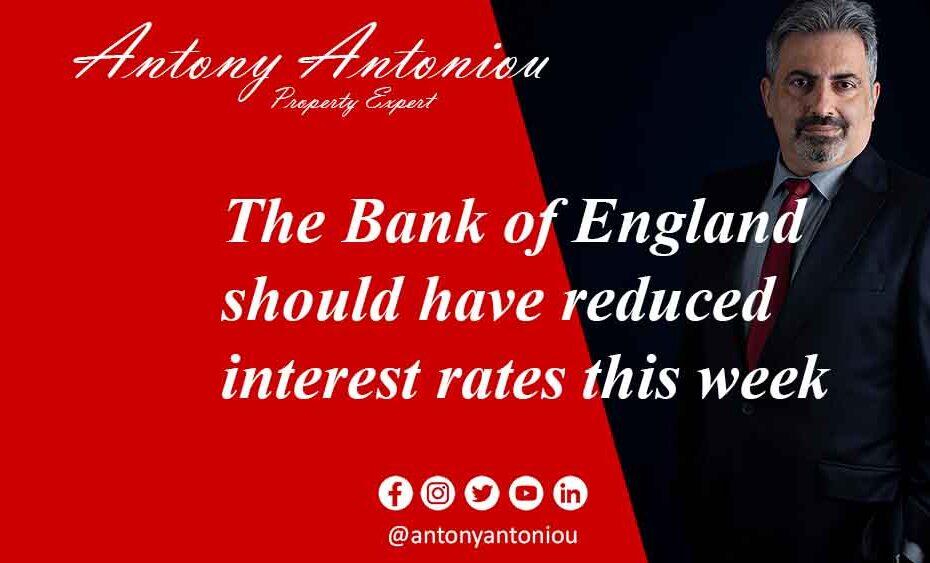The Bank of England should have reduced interest rates this week
The Bank of England’s Inaction on Interest Rates is Choking the Economy
The Bank of England (BoE) decided against cutting interest rates this week, a move that many economists believe was a mistake. With inflation rising rapidly and the economy at risk of recession, a rate cut could have provided much-needed stimulus. In this post, I’ll summarise the key arguments made in a recent video about why the BoE should have reduced rates.
Inflation Not Under Control
The BoE seems complacent about surging inflation, which is now well above its 2% target. As the video explains, “The inflation rate trajectory Is On Target not just to meet their target but also to overshoot it”. Inflation in the UK recently hit a 30-year high of 5.4%, squeezing household budgets and dampening consumer demand.
By contrast, the US Federal Reserve has responded much more aggressively to inflation by quickly raising interest rates. This prompt action seems to have worked, as American inflation has already peaked. The BoE’s gradual approach looks dangerously passive by comparison. As the video says, they are “dragging their feet and acting like the last person in a long line of a geriatric conga”.
Economy Heading Towards Recession
There are growing fears that the UK economy is slowing rapidly and could enter recession later this year. High inflation, tax rises and global uncertainty are all weighing heavily on business and consumer confidence. Most forecasters have slashed UK growth projections for 2023.
And yet, despite the worrying signs, the BoE refused to provide any additional monetary stimulus this week. Cutting rates could have given the economy a much-needed shot in the arm. Leaving them unchanged risks throttling the economy, which until recently had been “very strong, resilient and buoyant” as noted in the video.
BoE Policy Is the Worst for Decades
It seems the Bank’s cautious monetary policy is proving extremely harmful. Record-low interest rates during the pandemic over-stimulated demand, while global supply shortages pushed up costs. Now the BoE appears reluctant to cool the economy down sufficiently as it continues trying to support growth.
This stop-start approach is creating the worst of both worlds – surging inflation alongside faltering growth. Some commentators believe the Bank’s monetary policy errors in recent years have been more damaging than anything seen for decades. As put in the video, “it has been mooted that the Bank of England’s monetary policy is the worst since the days of Robin Hood”.
What the BoE Should Do Now
To provide more support to the weakening economy, the BoE should have cut its base rate this week and indicated further gradual reductions would likely follow. The video argues they could have reduced rates “by a quarter this time and another quarter if not next time then the time after that and one more after that at the very least”.
Such pre-emptive action would lower borrowing costs in the real economy and hopefully prevent an outright recession. Leaving rates unchanged increases the risk of later needing sudden, dramatic cuts. That’s what happened back in the financial crisis in 2008 when the BoE was forced into emergency action. To avoid another cash crunch, gradual cuts now would be wise.
The Stakes Could Not Be Higher
With living standards falling, taxes rising and the housing market cooling fast, these are nervous times for the UK economy. That calls for proactive, creative policymaking from the Bank of England. Yet instead, Threadneedle Street’s monetary mandarins seem stuck in their ways, unwilling to admit past mistakes or take bold new steps.
If the Bank continues dragging its feet on interest rates, the video starkly warns they risk “driving our economy into a serious recession”. After the havoc wreaked by Covid in recent years, that is the last thing hard-pressed British households and businesses need now. The BoE must wake up fast and smell the coffee, or else public anger at surging costs and shrinking growth will boil over. There is no time left to lose.
Key Takeaways
• The Bank of England decided against cutting interest rates this week, even with high inflation and a slowing economy
• This passive approach risks causing a recession and stands in contrast to the US Fed’s more aggressive inflation-fighting
• BoE policy over recent years has led to the worst monetary mistakes since the days of Robin Hood
• Gradual interest rate cuts now could have supported growth without over-stimulating the economy
• Further inaction means possible emergency cuts later if the economy deteriorates into crisis
• Living standards are already falling amid slowing growth – a recession could create serious public backlash
• The BoE needs to wake up fast to the mounting risks and take bold, creative action to steer Britain safely through the building storm

